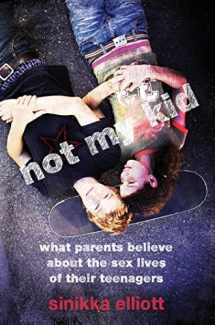
Not My Kid: What Parents Believe about the Sex Lives of Their Teenagers
ISBN-13:
9780814722589
ISBN-10:
081472258X
Author:
Sinikka Elliott
Publication date:
2012
Publisher:
NYU Press
Format:
Hardcover
224 pages
Category:
Sexuality
,
Psychology & Counseling
,
Behavioral Sciences
,
Sexuality
,
Psychology
,
Sociology
FREE US shipping
Book details
ISBN-13:
9780814722589
ISBN-10:
081472258X
Author:
Sinikka Elliott
Publication date:
2012
Publisher:
NYU Press
Format:
Hardcover
224 pages
Category:
Sexuality
,
Psychology & Counseling
,
Behavioral Sciences
,
Sexuality
,
Psychology
,
Sociology
Summary
Not My Kid: What Parents Believe about the Sex Lives of Their Teenagers (ISBN-13: 9780814722589 and ISBN-10: 081472258X), written by authors
Sinikka Elliott, was published by NYU Press in 2012.
With an overall rating of 4.0 stars, it's a notable title among other
Sexuality
(Psychology & Counseling, Behavioral Sciences, Sexuality, Psychology, Sociology) books. You can easily purchase or rent Not My Kid: What Parents Believe about the Sex Lives of Their Teenagers (Hardcover) from BooksRun,
along with many other new and used
Sexuality
books
and textbooks.
And, if you're looking to sell your copy, our current buyback offer is $0.3.
Description
Teenagers have sex. While almost all parents understand that many teenagers are sexually active, there is a paradox in many parents’ thinking: they insist their own teen children are not sexual, but characterize their children’s peers as sexually-driven and hypersexual. Rather than accuse parents of being in denial, Sinikka Elliott teases out the complex dynamics behind this thinking, demonstrating that it is rooted in fears and anxieties about being a good parent, the risks of teen sexual activity, and teenagers’ future economic and social status. Parents—like most Americans—equate teen sexuality with heartache, disease, pregnancy, promiscuity, and deviance and want their teen children to be protected from these things.Going beyond the hype and controversy, Elliott examines how a diverse group of American parents of teenagers understand teen sexuality, showing that, in contrast to the idea that parents are polarized in their beliefs, parents are confused, anxious, and ambivalent about teen sexual activity and how best to guide their own children’s sexuality. Framed with an eye to the debates about teenage abstinence and sex education in school, Elliott also links parents’ understandings to the contradictory messages and broad moral panic around child and teen sexuality. Ultimately, Elliott considers the social and cultural conditions that might make it easier for parents to talk with their teens about sex, calling for new ways of thinking and talking about teen sexuality that promote social justice and empower parents to embrace their children as fully sexual subjects.


We would LOVE it if you could help us and other readers by reviewing the book
Book review

Congratulations! We have received your book review.
{user}
{createdAt}
by {truncated_author}


